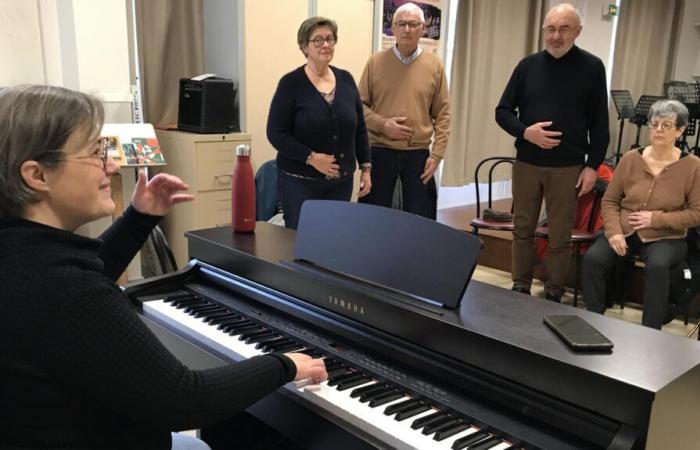“Pa, ra, pi, da, doom, tchac! » The hands mark the rhythm by tapping the thighs and chest, the onomatopoeias are sung, accompanying the gesture. The voice and the body express themselves together, concluding the first “Parkinson” singing session held Thursday January 9, 2025 in the morning in the Emig room (School of music and arts of the intercommunality of Val de Gartempe), in Montmorillon.
Parkinson’s creates blockages, rigidity, everything is slowed down. This creates swallowing problems. Singing helps open breathing
Chantal Puissesseau
Elsie Griffiths guides her small group of eight people through these vocal and body exercises. Four caregivers came with their wife, husband, brother or mother suffering from Parkinson’s disease. France Parkinson and Emig organize this time for them, which is both friendly and therapeutic. “With Parkinson’s, we feel the loss of voice more quickly, the feeling of not being heard”slips a participant who lives with the disease.
“Parkinson creates blockages, rigidity, everything is slowed down. This creates swallowing problems. Singing allows you to open your breathing »indicates Chantal Puissesseau, volunteer delegate of the Vienne France Parkinson committee, who came with her 97-year-old mother affected by this progressive neurodegenerative disease.
The exercises are generally done standing up, within the capabilities of each person.
© Photo Xavier Roche-Bayard
Speech difficulties, tiring efforts to speak which require you to raise your voice to be understood, which can lead to social isolation…: the disease also has psychological repercussions. Practicing singing techniques is a way to counter them. Elsie Griffiths is a choir conductor, singing teacher and director of the Emig. She knows how to reassure her students. “It does not replace speech therapy. By singing, we will have fun but also learn to position our voice and work the muscles correctly. It’s a lot of work on breathing. »
By soliciting the vocal cords, it uses gestures and ventral breathing. “We are going to make these three brains work at the same time”she said with a big smile. Not so easy to coordinate everything but the small group is working hard, and quite well.
Latent trauma
The teacher is very educational, explaining why we talk about abdominal breathing in an era of societal injunctions for a flat stomach. “Free the stomach and the mouth!” »says Elsie Griffiths, like a protest slogan. On this advice, everyone opens their mouths, unclenches their jaws, relaxes their shoulders. Little smiles, immediate effect, the belly swells automatically. “What’s between your jaw and shoulders?” Your vocal cords »slips the choir director.
End of exercises. The first few turned heads a bit. “I sang a long time ago, when I was young, at boarding school”, confides a participant. A remark that Elsie Griffiths knows: “Children are often told to be quiet, but this can create trauma. I have people who come to learn to sing at the age of 60 because of this. » To live better with Parkinson’s, it is advisable to open it.
Singing workshop open to Parkinson’s patients and caregivers, every Thursday from 10 a.m. to 11 a.m., at Emig, 2, place du Vieux-Marché, in Montmorillon. Registration and information: Chantal Puissesseau, 06.86.37.33.00
A gymnastics workshop adapted for people with Parkinson’s is held every Friday at 10:45 a.m. at the Montmorillon dojo.






